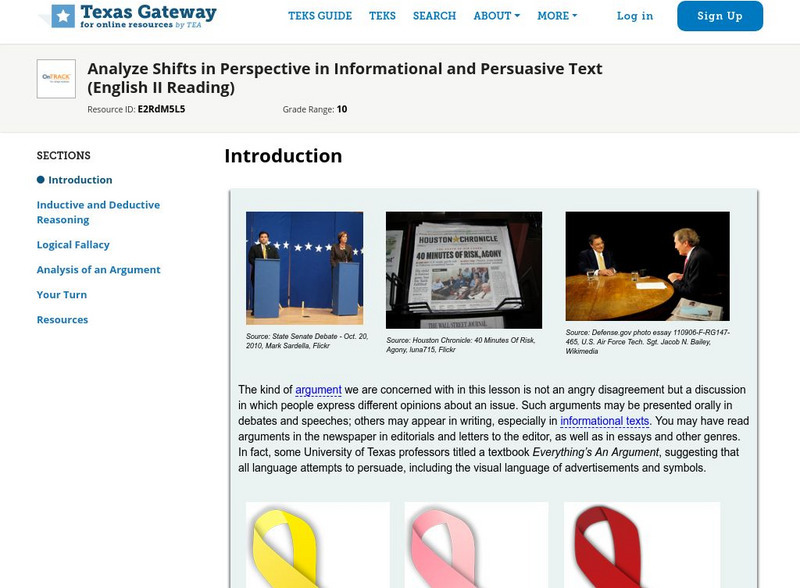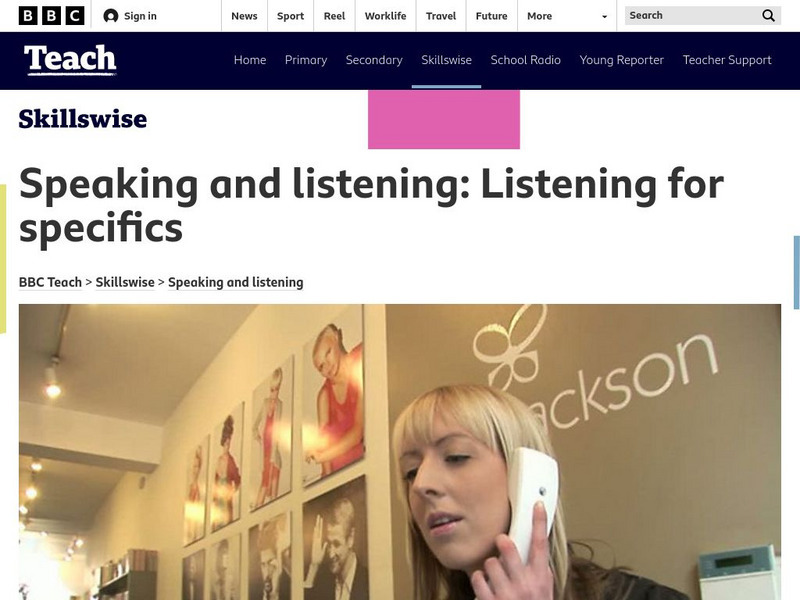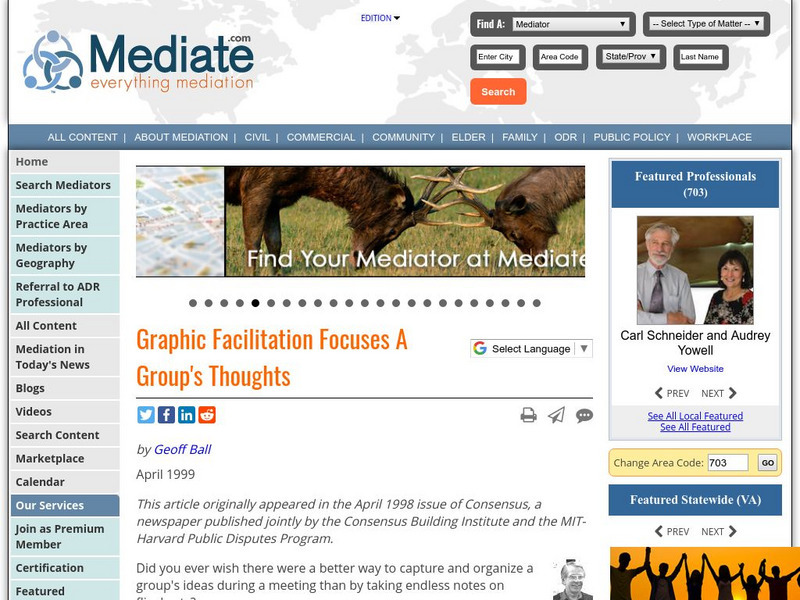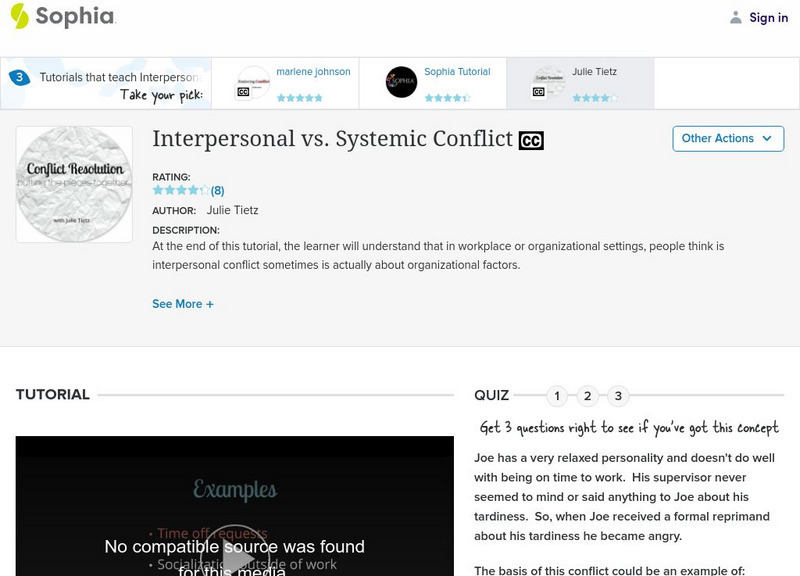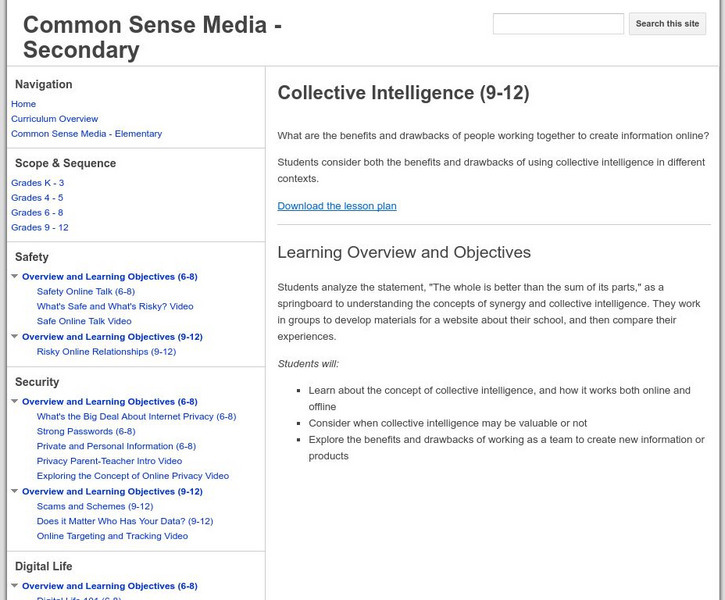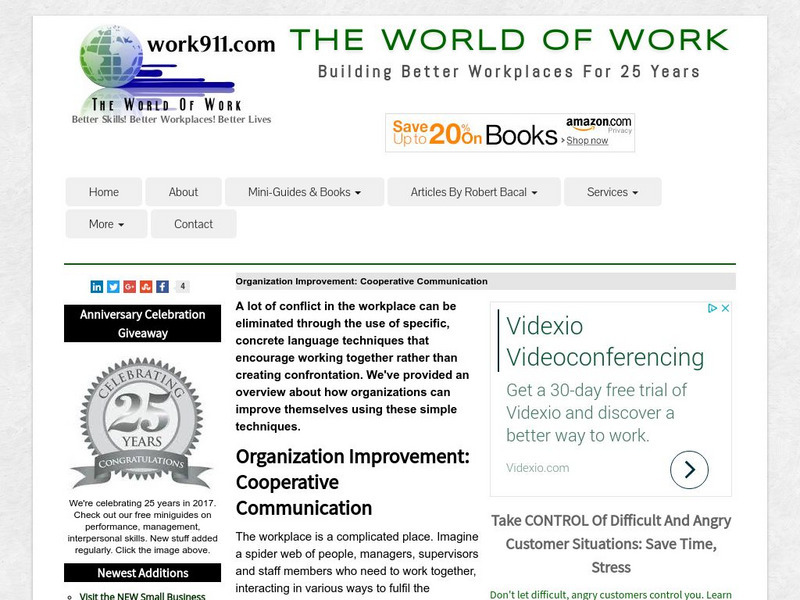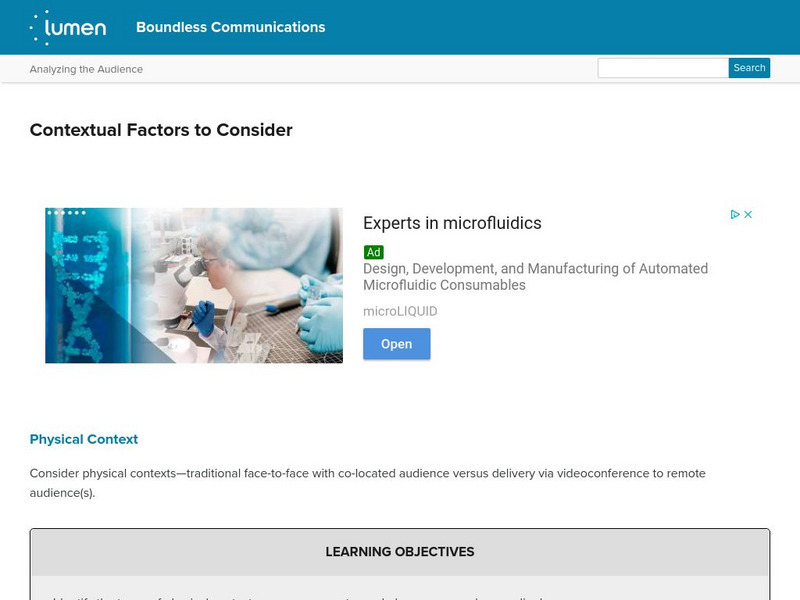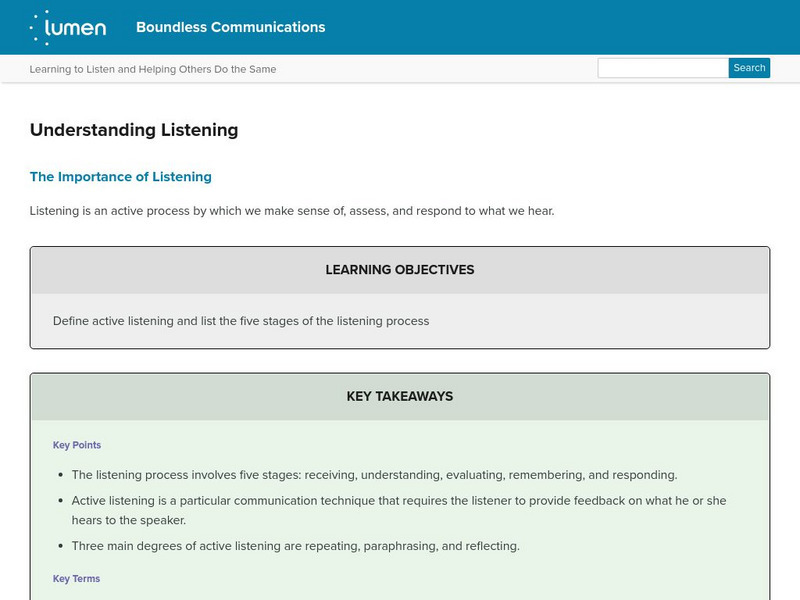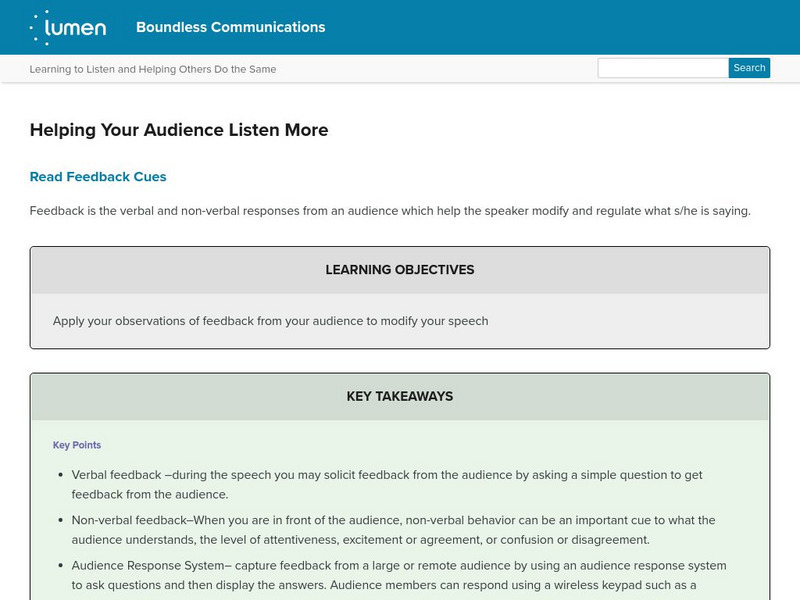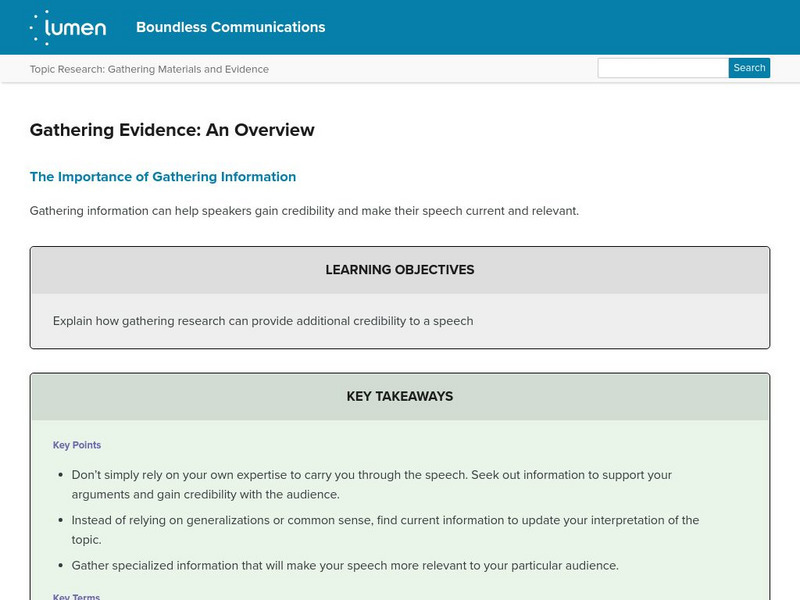Texas Education Agency
Texas Gateway: Analyze Shifts in Perspective in Informational & Persuasive Text
[Accessible by TX Educators. Free Registration/Login Required] In this lesson, students will read informational texts and identify varying perspectives in different arguments on the same topic. You will also analyze the reasoning and the...
CPALMS
Cpalms: Lafs.8.sl.1.3
Choose from among lesson plans, assessments, and original student tutorials to teach how to analyze a speaker's arguments.
University of Pittsburgh
University of Pittsburg: Communicating Behaviors for Effective Work Groups
Successful working groups are marked by a range of different communication behaviors-actions people do with words and gestures, which they can practice and improve over time. This site lists seven behaviors to improve communication in...
BBC
Bbc Skillswise: Listening for Specific Information
This tutorial presents a video, factsheets, and worksheets for learning how to listen for and understand information. It looks at how to handle different situations, e.g., arranging a delivery, asking questions about a product before...
Thinkport Education
Thinkport: Writing Explanation Part 3: Building an Argument
In this module, students will explore how claims, counterclaims, evidence and reasoning are used to write an effective argument. Students will read texts that discuss the climate change debate.
Philosophy Pages
Philosophy Pages: Categorical Syllogisms
Provides a detailed look at syllogisms. Sections include the following: "The Structure of Syllogism," "Standard Form," "Form and Validity," and "Diagramming Syllogisms."
Polk Brothers Foundation Center for Urban Education at DePaul University
Depaul University: Center for Urban Education: Contrast Points of View [Pdf]
A graphic organizer is provided for students to use as they analyze arguments. Students will find a guiding question to answer after they complete this graphic organizer.
Other
Speaking Effectively: Supporting the Talk
This substantial section focuses on supporting the main points of your speech or presentation. Find out how to avoid faulty reasoning and irrational appeals.
Other
Manitoba: Guidelines for Judging Debate
Scale given for grading, plus explanations of each catagory.
Other
Mediate: Graphic Facilitation Focuses a Group's Thoughts
This article discusses what graphic facilitation is and how it can focus a group's thoughts and understanding. An example is provided showing how it resolved a conflict between two groups.
Sophia Learning
Sophia: Interpersonal or Systemic: When the Rules Are the Problem: Lesson 1
At the end of this tutorial, the learner will understand that in workplace or organizational settings, people think is interpersonal conflict sometimes is actually about organizational factors. It is 1 of 3 in the series titled...
Common Sense Media
Common Sense Media: Education: Collective Intelligence (Grades 9 12)
Students analyze the statement, "The whole is better than the sum of its parts," to understand the concepts of synergy and collective intelligence. They consider both the benefits and drawbacks of using collective intelligence in...
Biz Move
Biz Move: Overcoming Communication Barriers How to Overcome Noise in Communication
Discusses communication barriers, particularly in the work environment, and examines how to overcome them. Barriers discussed include noise, faulty feedback, poor media selection, mental barriers, poor word selection, time and space...
Biz Move
Biz Move: How to Be a Better Listener
Article on the importance of listening in the business setting. Explains what listening is, gives guidelines, and lists barriers.
Other
Work 911: Cooperative Communication
This site defines "Cooperative Communication" and provides examples and information as to how to apply it. Although the article is geared toward the workplace, it applies to all forms of communication, especially when negotiating....
Other
Focusing on Interests Rather Than Positions Conflict
This site contains six rules to follow that will reduce conflict and increase cooperation when negotiating.
Other
Vancouver Community Net: The Citizen's Handbook: Facilitating
Offers tips to help facilitate a meeting effectively. Provides several important suggestions along with examples and details.
Brown University
Brown University: Debates
Use this resource to learn how to engage in collaborative discourse and argumentation enhances student's conceptual understandings and refines their reasoning abilities. Be sure to click on the links to other resources.
Other
Inter Link: Achieving Effectiveness Through Team Communication
Article discusses how to achieve better team communication. Lists the components of team communication along with barriers to effective communication. Also provides a section on feedback. SL.9-10.1d Possitive Communication Stratagies,...
Lumen Learning
Lumen: Boundless Communications: Contextual Factors to Consider
This lesson focuses on contextual factors to consider when analyzing your audience including physical contexts, values, beliefs, attitudes, and needs, audience opinion of you and your topic, and audience knowledge of your topic.
Lumen Learning
Lumen: Boundless Communications: Understanding Listening
This lesson focuses on understanding listening including defining active listening, the five stages of the listening process, listening and critical thinking, and the four main barriers to effective listening.
Lumen Learning
Lumen: Boundless Communications: Helping Your Audience Listen More
This lesson focuses on helping your audience listen better by offering strategies such as read feedback cues, employ strategies for maintaining audience focus, use strategies to maximize audience understanding, build credibility, and...
Lumen Learning
Lumen: Boundless Communications: Gathering Evidence: An Overview
This lesson focuses on the importance of gathering information that provides evidence for your topic that is credible, current, and relevant. It also discusses how to find and evaluate sources. SL.9-10.1a Prepared/Discuss
Lumen Learning
Lumen: Boundless Communications: Logical Appeals
This lesson focuses on using logical appeals in persuasive speeches including inductive and deductive reasoning, inductive reasoning and associative reasoning, forming a rational appeal, and errors in reasoning-formal and informal.


